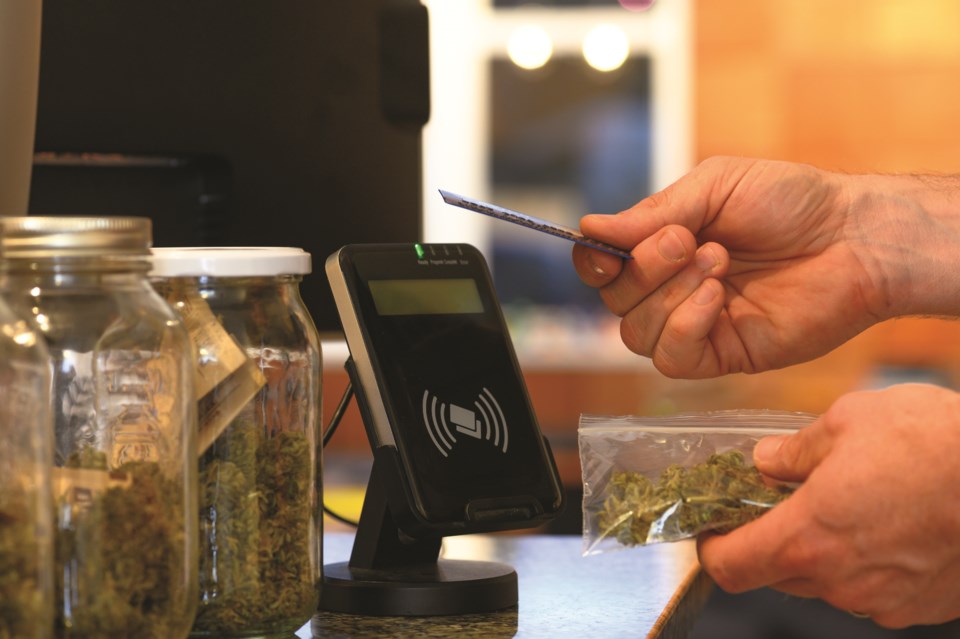Cannabis entrepreneurs eager to get their foot into the Whistler market will have to wait some time yet, with the municipality anticipating opening applications to prospective retailers as early as this fall.
So, going on four years since legalization, when can the resort expect its long-awaited first pot shop?
“I can’t say with any certainty when the first store will open,” explained John Chapman, planning manager with the Resort Municipality of Whistler (RMOW), at a virtual cannabis retail workshop last Thursday, Feb. 17. “There are aspects of the approvals that we at the municipality have control over and aspects [provincially] that we don’t have control over. So at this point, we are working on developing the framework, the various bylaw amendments and the policy document that will allow us to receive applications.”
More than 70 virtual attendees tuned in to the RMOW’s online session on Feb. 17, where municipal staff gave an overview of its proposed cannabis retail consideration framework and took questions and input from the public.
The input will be used to finalize the framework and prepare a future report to council.
First greenlit in December, the retail strategy recommends up to five retail shops in the resort, with potential for two in Whistler Village, one in Function Junction, one in Creekside, and one in Nesters Plaza. The stores would be subject to provincial requirements around distancing from sensitive areas such as schools, and the RMOW could also add additional distancing requirements through its zoning bylaws.
Each development permit area would be subject to specific design guidelines as well, and the municipality could look to Whistler’s Official Community Plan for any additional potential design criteria.
“Certainly what stores look like will be of great concern to us,” said Chapman, noting that staff will work to define the key design elements in the framework—which could include everything from frontage size to square footage—“so that applicants can understand and respond to design expectations when they’re bringing their applications forward.”
Staff is recommending a Temporary Use Permit (TUP) approach, which could be implemented faster than a rezoning while allowing municipal discretion over where and when shops open up in the resort. For successful applicants, a three-year TUP would be issued initially, with the possibility to renew for another three years.
Several attendees to last week’s session raised concerns over the TUP approach.
“The TUP framework will create challenges with business operators and landlords in establishing an effective lease agreement. In my experience it means that the lease rate will come [at] a significant premium, which this industry’s margins … cannot support,” wrote Harrison Stoker in an online comment during the session. “With the single renewal opportunity, this is a huge risk for businesses.”
Chapman acknowledged the relative uncertainty of the TUP approach, but noted there are two options potentially in play following the initial six-year period: opening up another TUP application, or moving to site-specific zoning for areas allowing cannabis sales, an approach other B.C. communities that initially implemented a TUP system have adopted. The RMOW intends to review its cannabis framework during the initial TUP phase to gauge what’s working and what’s not, Chapman added.
Although they won’t necessarily have to have a lease signed, prospective operators will need an appropriate store space secured prior to submitting a TUP application, with no guarantee of a thumbs up and what is likely to be a lengthy approval process both locally and provincially.
“One of the ways to address that is by trying to start now with communicating what we’re proposing to do, and then, as we are designing the application process, the intake and review process, just making sure that we’re doing it in a really clear way so it’s easy to understand the expectations [and] the requirements,” Chapman said.
“And yeah, absolutely, having an efficient approval process, we get that that’s important and necessary.”
The RMOW has several objectives it will use to consider retail cannabis applications, guided in large part by the goals and values listed in Whistler’s updated Official Community Plan: “We want to think about our thriving local economy; Whistler’s mountain community character and culture; we want to think about how cannabis retail can promote community and social well-being,” Chapman explained. “That idea of sustainable local livelihoods, so really, a living wage and things like that. We want businesses that can support people who are in Whistler, and we want that to be sustainable.”
The consultation period closes at 11:59 p.m. on March 7. The general public can give feedback at engage.whistler.ca/cannabisretail or via email at [email protected], while industry can use the same email or comment at engage.whistler.ca/cannabisretailindustry. Once the consultation period closes, the RMOW will summarize what it has heard in a report to council that will include more details on the framework, application requirements and bylaw amendments.




